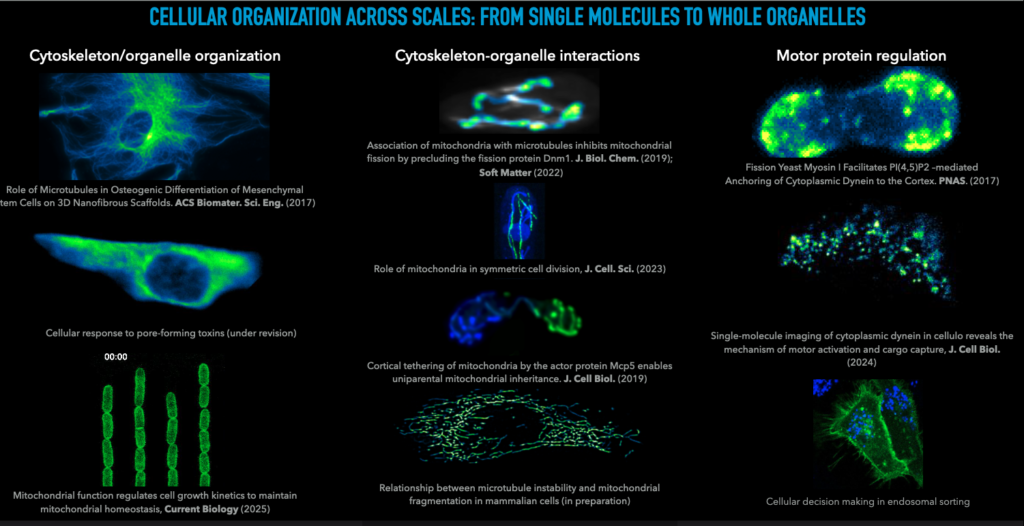Cells employ tiny machines called ‘motor proteins’ to carry out a myriad of functions including maintenance of cellular organisation, transport of substances across the cell, and generation of forces required for cell division. These activities of motor proteins are facilitated by polymers inside the cell termed ‘microtubules’. Microtubules function as tracks for motor movement, and alternately as ropes which motor proteins pull on. Several cellular processes require a coordination of motor proteins and microtubules. Scientists have gained a wealth of information by replicating cellular processes involving motors and microtubules outside living cell, in what are called ‘in vitro’ experiments. However, understanding the complex intracellular milieu within which motors operate to organise the cell remains an elusive quest. A thorough investigation of processes regulating motors and microtubules therefore lets us see how these processes unravel in both contexts of health and disease (including neurodegeneration and cancers), where they go rogue.
Our main research themes are:
Regulation of motor proteins
Cytoskeleton-organelle interactions
Intracellular organisation
Cellular decision making
In vivo single-molecule imaging
Snapshot of our research

Overarching theme
The central theme of our lab’s research is uncovering how stochastic interactions between motor proteins, cytoskeleton and cellular cargo give rise to dynamic yet robust intracellular organisation. Understanding how the cytoskeleton and motor proteins work together to regulate the morphology, transport and positioning of intracellular compartments is essential not only to decode the mechanisms underlying normal cellular functioning, but also to determine the molecular underpinnings of disease, where the same processes go rogue.
New tools for quantitative cell biology and biophysics
Given the complex nature of the research undertaken in our lab, pre-existing tools and techniques do not fully capture the intricacies of intracellular interactions. A significant focus of the lab is thus to develop new techniques (e.g., gentle organelle isolation) and image analysis pipelines (e.g., single-molecule tracking), and adapt existing tools in new ways (e.g., optogenetics, micropatterning) to enable unprecedented discoveries in living cells.
Collaborative and inclusive science to uncover biological principles
Interdisciplinary teams can tackle complex biological questions more effectively, leading to insights that might not emerge within isolated fields. So too, we strongly believe that science benefits immensely from the perspectives and voices of diverse and inclusive teams.
My group and I thus undertake an inclusive, collaborative approach, amalgamating the expertise of individuals at different career stages, scientific fields (e.g., Engineering, Physics, Neuroscience) and geographies (e.g., India, Germany, USA) with the central goal of answering the most fundamental biological questions.If you want to learn more about our research, please don’t hesitate to get in touch.
Our Values
We are committed to fostering a welcoming, respectful, and inclusive environment while we have fun doing our science.
